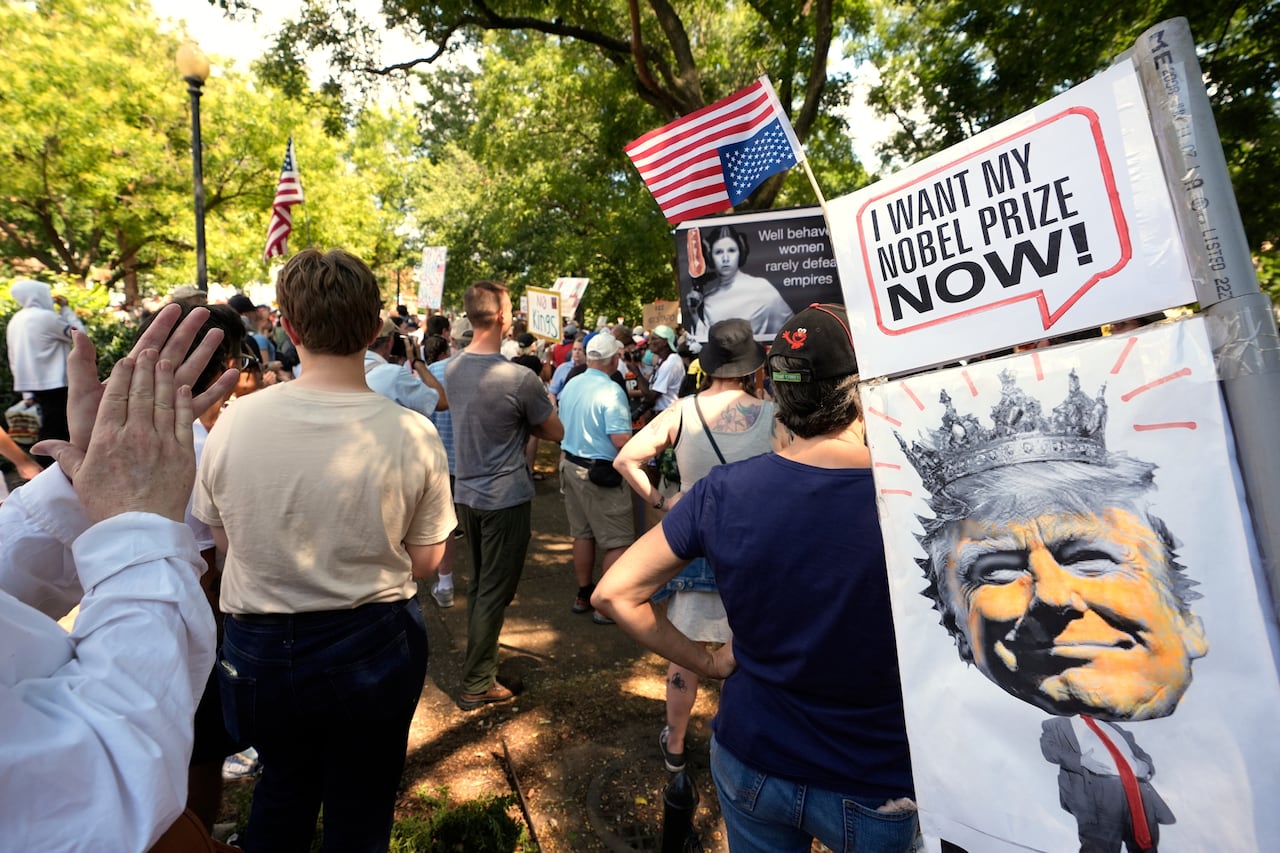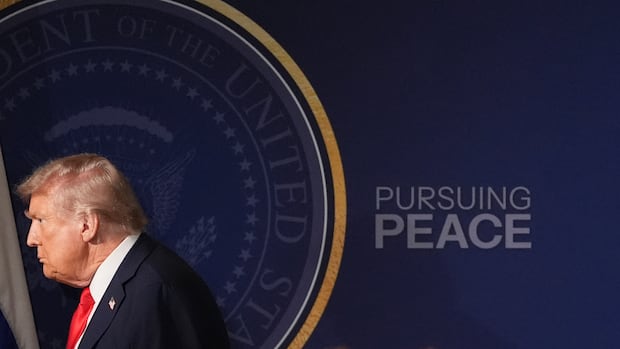Donald Trump has made no secret of his desire to a win a Nobel Peace Prize to burnish his already significant legacy as a U.S. president, and a lasting peace that ends the war in Gaza could be a consideration for the committee that determines the prize winner.
A British betting agency spokesperson told Newsweek that the odds for Trump winning the 2025 peace prize to be announced on Friday morning have improved significantly in recent hours, given the flurry of activity that led to the announcement of the first phase of a ceasefire deal to end the two-year war between Israel and Hamas.
It may be a case where the cliché “a fool and his money are easily parted” applies.
A spokesperson for the Norwegian Nobel Institute confirmed to news organization Agence France-Presse that the final meeting of the committee was on Monday. That meeting was the culmination of a process of winnowing down 338 nominees this year.
Kristian Berg Harpviken, the Nobel committee’s secretary, confirmed to Reuters last month that “a specific peace process” or “new type of international agreement that is under development or that has recently been adopted” are the types of things that would be considered.
But there’s one problematic detail for Trump: the deadline for nominations was Jan. 31, just days after he took office for his second, non-consecutive term as president.
WATCH | Will the timing be right for this deal?:
Scott Lucas, international politics professor at University College Dublin, says the U.S.-proposed ceasefire plan is welcome, but many details will still need to be fleshed out, including disarmament, the restoration of aid and security arrangements.
Aiming to be 5th presidential winner
Four U.S. presidents have previously won the peace prize, though Jimmy Carter’s honour came decades after he served in the Oval Office.
Bill Clinton is not among the presidential winners, and may be an instructive case as to whether Trump would be a significant contender for a future peace prize, based on the embryonic 20-point Mideast peace plan, which involved mediation from several countries and, according to analysts, faces many daunting questions and obstacles.
Clinton famously convened over a ceremony in 1993 as part of the Oslo Accords, attended by Israel’s then-prime minister Yitzhak Rabin and foreign minister Shimon Peres, as well as Yasser Arafat, head of the Palestinian Liberation Organization.

The 1994 Nobel was awarded to Arafat, Peres and Rabin, not Clinton nor any American or Norwegian diplomats who helped in mediation.
Rabin in 1995 would be assassinated by an Israeli extremist angered by the rapprochement, but Clinton tried again in 2000 to broker peace, bringing Israeli and Palestinian delegations to the presidential retreat Camp David. While it was ultimately not a successful intervention, Clinton’s yearslong efforts appear to have been more involved at a granular level compared to what Trump, or any president, could reasonably accomplish in just several months in office.
LISTEN | Revisiting the Oslo Accords:
Ideas53:59Inventing Peace: The Oslo Accords
When Israeli Prime Minister Yitzhak Rabin and Palestine Liberation Organization leader Yasser Arafat met in Washington to sign the first Oslo Accords, it was supposed to usher in a new era of peace and lay the groundwork for a more stable Middle East and a Palestinian state. Three decades later, the Accords are primarily remembered as a failure. Nahlah Ayed and guests discuss what went wrong, and what lessons the Oslo Accords hold for the future.
War-ending claims are contested
Trump has boasted about ending several wars this year — the number of wars has varied between six and seven and has led to derision in some quarters. Some of the “wars” Trump has cited appear to have been flareups, as with Thailand and Cambodia, and his specific role in mediation is murky at best in some instances.
Theo Zenou, a historian and research fellow at the Henry Jackson Society, a foreign policy and national security think-tank, told The Associated Press this week that Trump’s efforts have not yet been proven to be long-lasting.
“There’s a huge difference between getting fighting to stop in the short term and resolving the root causes of the conflict,” Zenou said.
WATCH | Netanyahu pushes for Trump’s Nobel consideration:
Israeli Prime Minister Benjamin Netanyahu announced Monday he had nominated U.S. President Donald Trump for the Nobel Peace Prize, following scheduled ceasefire talks at the White House.
One of the wars Trump has cited refers to some of the most significant hostilities in several years between rivals India and Pakistan, which occurred this past spring. But India’s foreign minister and defence minister have balked at the suggestion Trump played a significant role in their country pulling back from the aerial and ground attacks.
Nevertheless, Pakistan and Cambodia both say they’ve nominated Trump for the prize — but those initiatives would have come after Jan. 31. However, it’s also important to point out that the peace prize committee doesn’t confirm whether someone has been nominated in a particular year until 50 years after the fact, so it’s theoretically possible such comments can be made without the corresponding action, as there would be no consequence for diplomats who have long since died.
Benjamin Netanyahu in the summer said he was nominating Trump, but the Israeli prime minister primarily cited Trump’s efforts more than four years ago as the U.S.-led rapprochement between Israel and a handful of Arab countries.
Governments not the only ones who can nominate
Trump wouldn’t be the first controversial Nobel choice, as the list includes Arafat and former top U.S. diplomat Henry Kissinger.
While representatives of national governments can put forth Trump’s name for consideration, it seems questionable whether other eligible nominators would.
The list of who can nominate a person or entity includes members of the International Court of Justice (ICJ) at the Hague, a body that has urged Israel to prevent genocide against Palestinians in a case the U.S. strenuously objected. The ICJ in Trump’s first term criticized his administration for its attacks on the International Criminal Court.
The list also includes members of the International Board of the Women’s International League for Peace and Freedom. The Trump administration this year has slashed foreign and humanitarian aid, with significant adverse impact for women and children around the globe, and it has clamped down on nearly all asylum claims, with Trump previously asserting in 2023 that migrants were “poisoning the blood of our country.”
“His rhetoric does not point in a peaceful perspective,” Nina Græger, director of the Peace Research Institute Oslo, told The Associated Press this week.
It could also be argued that Trump’s actions do not match a “peaceful perspective.” The U.S. helped Israel bomb Iranian nuclear sites and, even more controversially, is currently launching strikes on boats in the Caribbean, arguing that vessels carrying drugs are enemy combatants.
WATCH | U.S. blurs lines on justification for boat strikes:
What’s President Donald Trump’s endgame with repeated U.S. strikes on boats near Venezuela? Andrew Chang breaks down the threats the Trump administration says it’s reacting to and why Venezuela’s relationship with China may also be a factor.
Images provided by Getty Images, The Canadian Press and Reuters.
A wide cross-section of university professors and directors can also put forth names for consideration. But Trump has likely not curried much favour with this contingent, as his administration has cut research grants and variously pressured U.S. postsecondary institutions over claims they are not combating antisemitism on campus or over the numbers of foreign students they are admitting.
Finally, the five individuals appointed by Norwegian parliament to lead the current committee are led by the head of the Norwegian branch of PEN International, a group defending freedom of expression.
Trump — who on Wednesday bizarrely and without clarity boasted that he “took the freedom of speech away” — has been accused of stifling speech as his administration has cited pro-Palestinian activism as grounds for denying visas or issuing deportations, and it has responded to mostly peaceful protests against his deportation agenda by moving to send the U.S. military in a number of U.S. cities.








